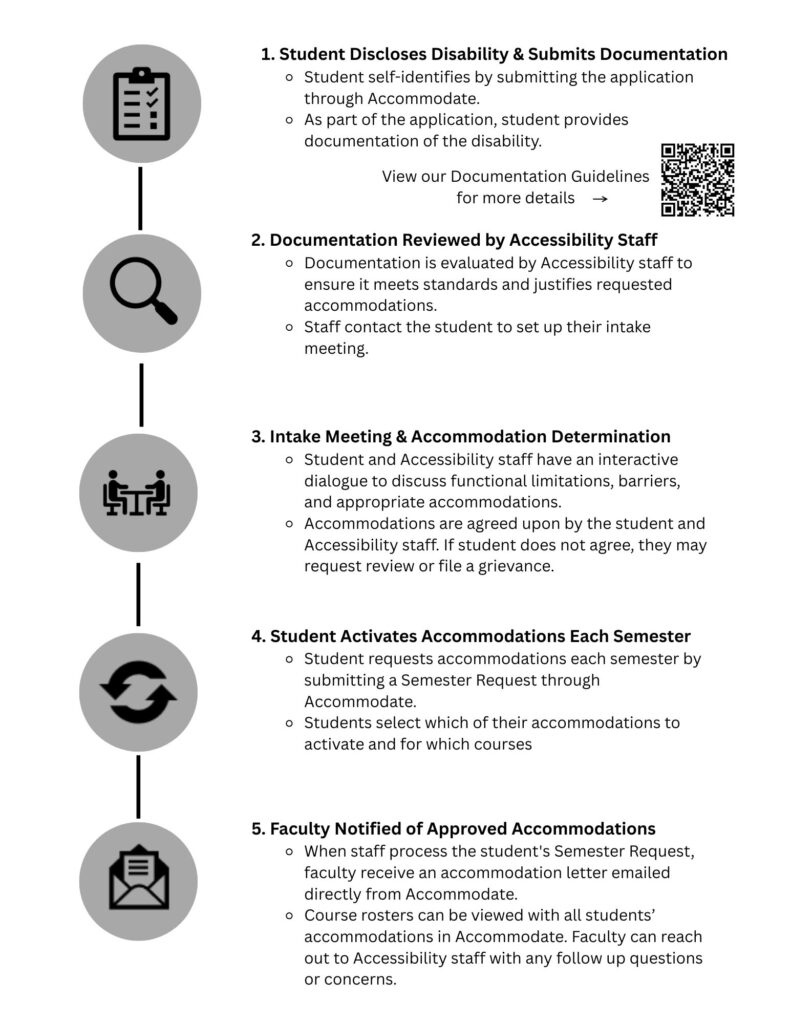Academic Accommodation Procedures
The Student Success Center (SSC) is committed to providing an equitable and inclusive learning environment for all Providence College students. As part of this commitment, the SSC provides reasonable academic accommodations and works to remove any barriers that may impede equal access to the College’s educational programs.
Any Providence College student (Undergraduate, Graduate, School of Continuing Education, etc.) with a disability is entitled to reasonable accommodations under the Americans with Disabilities Act and Section 504 of the Rehabilitation Act. Disabilities may include, but are not limited to, learning, ADHD, chronic illness, medical, physical, visual, hearing, and mental health. Academic accommodations are determined through a process that is both interactive and supportive.

1. Student Self Discloses Disability
Students must disclose a disability before any academic accommodations can be approved or provided. The disclosure process begins when students complete our Accommodations Application, available through Accommodate. As part of the application, students will upload supporting documentation (medical, clinical, neuropsychological). For more information, please review our Disability Documentation Guidelines. Students who complete the application will be contacted by the SSC to discuss next steps within 48 business hours.
Incoming students may begin this process in the summer prior to their first Fall semester.
2. Documentation Reviewed by Accessibility Staff
Along with our Accommodations Application, students must provide documentation which supports the need for specific accommodations. The documentation may include neuropsychological testing, medical reports, or clinical reports. Documentation should be no more than five years old. For more information, please review our Disability Documentation Guidelines. Accessibility staff will review applications and documentation then contact the student to discuss next steps within 48 business hours.
3. Student Meets with SSC
After appropriate information is submitted, the SSC will reach out to request a meeting to review the student’s academic accommodation requests. The student will have the opportunity to discuss their diagnosis, how it impacts them, the academic barriers they experience, and how specific accommodations will provide access. Based on documentation and discussion, the SSC approves reasonable accommodations and develops an academic accommodation plan.
4. Student Activates Accommodations Each Semester
Academic accommodation plans are reviewed and revised on a semesterly basis by students submitting a Semester Request through Accommodate. In some cases, academic accommodations may not be reasonable in certain courses. In these instances, a team of faculty and staff may be involved in the review process to determine whether an accommodation is appropriate for a specific course.
5. Faculty Notified of Approved Accommodations
Students must submit a Semester Request through Accommodate at the beginning of each new semester to activate their approved academic accommodations. The SSC will create a Faculty Academic Accommodation Letter, which will be emailed to the faculty. Members of the faculty cannot provide any academic accommodation until they receive official notification from the SSC.
Academic Accommodation Process Infographic

Request for Reconsideration
If the SSC determines a disability is not present and/or specific academic accommodations are not approved, the student may follow the Student Procedures for ADA/504 Grievance Resolution to request a reconsideration of their academic accommodations.
Non-Academic Related Accommodations
Students needing non-academic related accommodations (i.e. housing, dining, parking) should also contact Student Development and Compliance. This department coordinates non-academic accessibility needs of Providence College students who qualify. For more information, visit the Dean of Students Webpage.
Accessibility Services
Phillips Memorial Library | Room 250
401.865.2494
accommodations@providence.edu
Non-Academic Accessibility Accommodations
Dean of Students Office | Slavin Center 104
401.865.1070
accommodations@providence.edu





